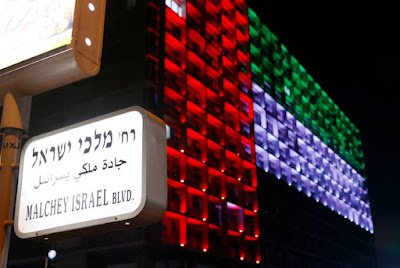The recent full normalization agreement between the United Arab Emirates (UAE) and Israel is a historic groundbreaking move that may mark the start of a whole new Middle East. Normalizing relationships between Arab countries and Israel is essential for sustaining long-term peace in the ever-boiling region. Every single step towards peace undermines the self-claimed legitimacy of terrorist organizations that have been wreaking havoc all over the Middle East, under the unrealistic slogans of “liberating Jerusalem” and “eliminating Israel.”
However, there is one little catch that may turn the UAE-Israel agreement into merely another document in the pile of similar previous peace agreements between Arab states and Israel. That is; the inability of engaging the Arab grassroots citizens in understanding and accepting the motives behind and the importance of establishing full normal relations with Israel. Working with Israel is a taboo topic in most, if not all, the Arab countries, since Nasser era. The signing of such taboo-breaking agreements with Israel should be paralleled with widespread social campaigns to educate and involve the average Arab citizens into adopting the agreement’s principles.
A recent survey, conducted in June, by the Washington Institute for Near East Policy (WINEP) found that “approximately 80% of Emiratis disagree with this statement: ‘people who want to have business or sports contacts with Israelis should be allowed to do so.’” In other words, only 20% of the surveyed Emirati people approve state’s policy to establish normal relations with Israel. Ironically, this is the same attitude of majority Arab citizens, including those living in countries that signed peace treaties with Israel, like Egypt.
UAE is not the first Arab country to make such a historic step towards peace. Egypt was the first Arab country to sign a peace treaty with Israel, in 1979. The Camp David Accord between Egypt and Israel stipulated full normalization in political, economic, and diplomatic relations between the two countries. Then, in 1994, Jordan and Israel made an agreement on establishing regular diplomatic relations. On the same year, Israel started normalizing its diplomatic relationships with Tunisia, Morocco, and Mauritania. In 1996, Oman, which had already kept good relationships with Israeli officials in Yitzhak Rabin’s government, signed an agreement with Israel on reciprocal opening of trade representative offices. However, Oman withdrew from the agreement after the eruption of the second Palestinian Intifada in 2000.
All of the aforementioned historic and brave agreements between Arab countries and Israel received massive international applaud, enormous attention by international media when announced. They also received lots of controversy over their legitimacy and motives among Arab observers and local media. Yet, unfortunately, a few months after the scoop, the agreements lost their glamour to the dusty shelf, while the anti-Semite voices of media figures, politicians, and Islamists were turned up high, once again, as they went on shaming those who supported peace initiatives with Israel and calling them “traitors.”
For decades, the Arab public opinion fell victim to systematic brainwashing by the anti-Semite discourse in media and politics. This rhetoric, which is playing on both nationalist sentiments and religious piety, portrays Israel (and the Jewish people, in general) as the enemy for the entire Arab world and the entire Muslim Ummah. Prior to the Arab Spring revolutions, Arab dictator regimes used the “Israel is the enemy” rhetoric to distract the people from protesting regime’s political failures and economic corruption. Up till today, Political Islamist groups, such as the Muslim Brotherhood and Hezbollah, and all Islamic terrorist organizations are depending on magnifying the anti-Israel / anti-Jew rhetoric in recruiting followers and attracting sponsors.
Turkey’s president Erdogan, who is also a member of the Muslim Brotherhood, plays this hate speech game, all the time. Erdogan and some of the high-profile Qatari officials were the first to condemn UAE for making a peace agreement with Israel. Erdogan accused UAE leadership of betraying the Palestinians and vowed to cut diplomatic ties with UAE and withdraw his ambassador; not the Turkish ambassador in Tel Aviv, but the Turkish ambassador in Abu Dhabi.
Therefore, to appropriately seal the deal between the United Arab Emirates and Israel and encourage more Arab countries to join the peace train, a huge effort needs to be made on the ground, among the grassroots citizens in all Arab countries. The average public citizens need to be properly educated about the importance of such peace agreements with Israel and accept to see Israel within the new reality of the region. This is the best way to guarantee the effectiveness and sustainability of peace initiatives in the region, while also countering the influence of Islamic extremism, terrorist groups, and their sponsor states.






